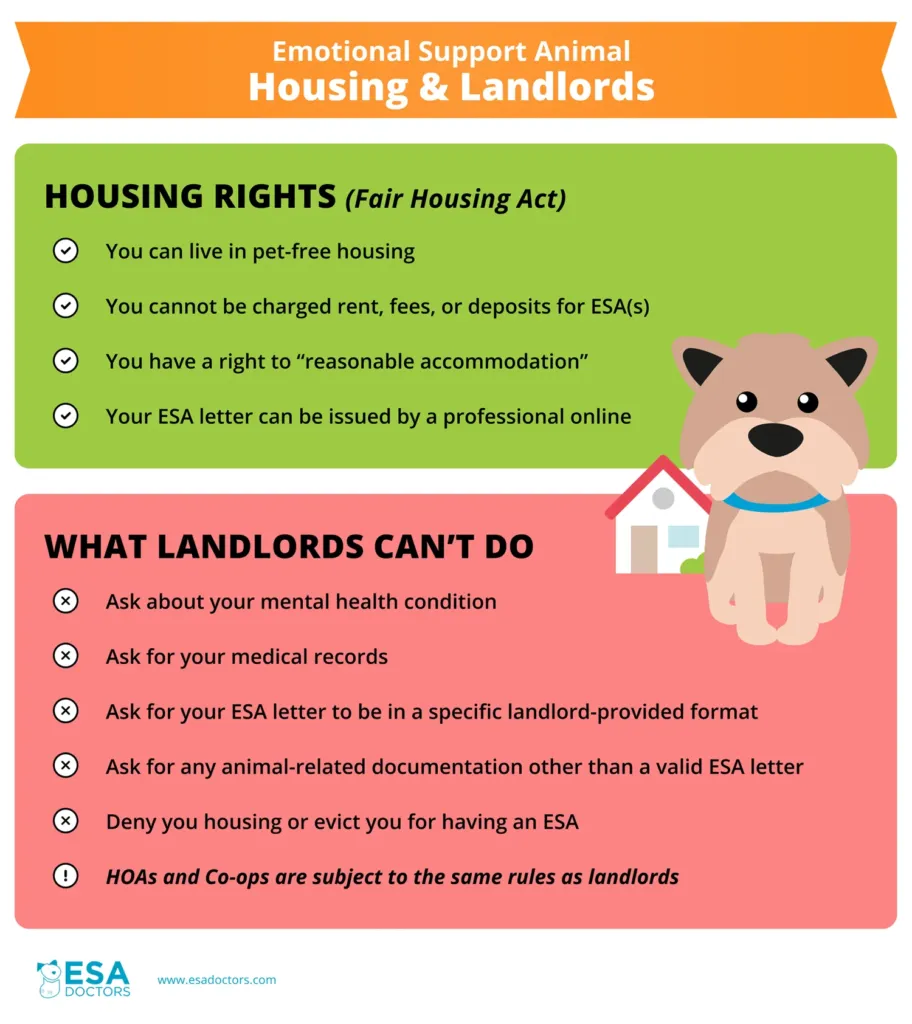The Fair Housing Act (FHA) is a federal law that safeguards tenants with disabilities. Under the FHA, a disability can be a mental health condition if it is severe enough.
Many individuals grappling with mental illness or emotional distress issues have emotional support animals (ESAs) that help manage their condition. Under the FHA, landlords have to accommodate tenants with ESAs, even if the building has a no-pets policy or other restrictions on pets.
If you are considering qualifying for an ESA or already have an ESA, this article is about your housing rights as a tenant under the Fair Housing Act.
ESA Housing Rights
The Fair Housing Act is one of the most important ESA laws that grants many rights to owners of ESAs in order to protect their ability to stay with their animals. These housing rights and the process to qualify for an ESA are addressed in guidelines published by the U.S. Department of Housing.
In summary, ESA owners enjoy the following housing rights:
- The ability to live in no-pet buildings.
- Freedom from pet fees and pet deposits.
- Exemption from pet size limits.
- Exemption from pet breed restrictions.
- Protection against discriminatory housing practices.
These rights for ESA owners ensure fair treatment for all potential and current tenants who need their emotional support animal. They promote equality and inclusivity in housing opportunities. These ESA housing rights also help to foster diverse, inclusive communities and guarantee fair treatment in the housing sector.
Why do emotional support animals get special treatment?

The FHA recognizes how important emotional support animals are to their owners. Without them, ESA owners would have a difficult time managing their mental health and be unable to live fulfilling lives. Emotional support animals are essential companions for people with conditions like depression, PTSD, chronic anxiety, and learning disorders.
ESAs are not considered normal pets under the FHA, which is why policies pertaining to pets do not apply to ESAs. They are legally recognized assistance animals that comfort people with mental health issues.
What documents are required for an emotional support animal?
Under the Fair Housing Act, a landlord has the right to ask for proper documentation for your emotional support animal. This document comes in the form of an ESA letter from a licensed healthcare professional (LHCP). Licensed health care professionals who can write an ESA letter include the following:
- Licensed therapists
- Licensed counselors
- Social workers
- Psychologists
- Psychiatrists
- Nurses and Nurse Practitioners
- Physicians and Physician Assistants
An ESA letter should be on the LHCP’s letterhead, signed and dated by the LHCP, and contain the LHCP’s contact and license information.
If you don’t know where to turn, ESA Doctors can help connect you to a healthcare professional that is licensed to assist you in your state and knowledgeable about ESAs.
What Landlords Cannot Ask You Under the FHA
When it comes to having an ESA, there are very specific rules and regulations under the FHA to protect your rights and privacy. Landlords:
- Cannot make you pay any extra rent, deposit, or fee for having an ESA
- Cannot ask you for extensive details about your disability
- Cannot make you register your emotional support animal (there is no such thing as an “official registry” for ESAs)
- Cannot request a “certification” for your emotional support animal (the only valid way to qualify for an ESA is with an ESA letter)
- Cannot require the animal to have specific training relating to a disability
Sometimes landlords will make additional demands on tenants after being presented with an ESA letter and request for accommodation. Landlords and housing providers need to proceed carefully with additional demands, as HUD guidance prohibits making certain requests.
For example, landlords can’t force a healthcare professional to use a specific form, provide notarized statements, make statements under penalty of perjury, or provide a tenant’s diagnosis or other detailed information about a person’s physical or mental impairments.
This point is especially important: in no circumstance can a housing provider require disclosure of details about the diagnosis or severity of the tenant’s disability, request medical records or require a medical examination.

When can a landlord deny an ESA under the Fair Housing Act?
Even though tenants with ESAs are generally protected by the Fair Housing Act, there are a few limited circumstances where the rules do not apply or a landlord can deny an ESA. The Fair Housing Act does not apply to:
- Owner-occupied buildings with no more than four units and
- Single-family homes sold or rented by the owner without the use of an agent
In addition, landlords can deny an ESA if the ESA poses a direct threat to the health and safety of others or would cause substantial property damage.

What if the landlord refuses to comply?
Unfortunately, some landlords can be extremely averse to ESAs or just uninformed about the rules and will put up unreasonable roadblocks to prevent tenants from living with their ESAs.
If your landlord is ignoring your ESA request, you should be aware that HUD has issued guidance stating that housing providers should respond within 10 days of receiving an ESA letter from a tenant.
Landlords also have to engage in good-faith dialogue with a tenant, making an ESA request in an “interactive process.” Before denying an ESA request for valid reasons, landlords have to allow tenants a reasonable opportunity to provide information confirming the tenant’s disability-related need for an ESA.
If you believe your landlord is denying accommodation of your ESA without proper justification, here are a couple of options:
- Make sure the landlord/owner of the property is aware of the Fair Housing Act rules and the penalties that may ensue if they fail to comply. Many landlords are often just unaware of the laws that cover them. It is always helpful to engage in a constructive dialogue with the landlord before taking more serious action.
- As a last resort, you can report and file an official complaint against the property manager/owner with the Department of Housing’s Office of Fair Housing and Equal Opportunity.
Violations of Fair Housing Rights
The Department of Housing can bring charges against landlords who fail to fulfill their obligations under the Fair Housing Act. Preventing a tenant from living with their ESA without valid justification can be considered discrimination and a violation of the FHA.
For example, in 2020 the U.S. Department of Housing brought charges against a landlord in St. Paul for discriminating against an individual with an ESA. HUD found that the potential tenant’s Fair Housing rights were violated when the landlord refused to accommodate their emotional support animal.
The Fair Housing Act and Emotional Support Animals
Understanding your rights as a tenant with an emotional support animal under the Fair Housing Act is vital to ensuring fair treatment. Don’t let landlords or property managers unjustly deny your ESA. Your rights under the Fair Housing Act protect you.
If you want to know if you qualify for an ESA, the first step involves seeking assistance from a healthcare professional. ESA Doctors can help by connecting you with licensed healthcare professionals capable of providing ESA recommendation letters to eligible individuals.
If you’re interested in obtaining an ESA, you can get started by filling out the questionnaire at the link below. This could be the first step towards securing the support and comfort an ESA can offer.
See if you qualify for an ESA letter below.
Get the Love and Support you Deserve!






Can an HOA / Condo Association with a no pet policy request an annual renewal of an owners validation letter?
Landlords can reasonably except to have an ESA letter that is current. Housing providers that require an annual renewal are not common, but it’s also not unheard of. Please see this article for more details: https://esadoctors.com/do-esa-letters-expire-how-to-renew/
Is the pet considered an ESA when a doctor states the need the pet or only once you fill out this ESA form you get approved?
We’re not sure what form you are referring to, but an ESA letter is the only document you need to qualify a pet as an emotional support animal. The ESA letter then has to be approved by the housing provider.
My landlord is asking for direct contact with my therapist via phone and email, is this allowed?
Landlords can verify an ESA letter but can’t ask any questions that would violate the privacy rights of the tenant.
I live with my ESA dog in a coop in NYC, that i own. I can only use the service elevator. Can the coop denied me the use of the building’s main elevators?
ESAs are generally allowed in common areas where other tenants can go. Unless there is a specific health or safety reason for the request, landlords cannot treat ESA owners differently from other tenants.
My landlord said I signed a contact that said “no pets” I was prescribed a ESA a almost a month after signing the lease and the landlord said no, then the landlord claims he is allergic and wont accommodate my ESA request. Are my rights still the same?
ESAs must be accommodated even if the lease or building policy prohibits pets. Your landlord can only deny your ESA due to allergies if they can prove that it would result in a direct threat to their health that can’t be mitigated.
is it legal for my apartment complex to insist that my ESA is neutered or deny him because he isnt neutered?
Fair Housing rules do not directly address this issue unfortunately.
I was charged 800.00 deposit for my well behind 4yr boarder collie I have paper work from my doctor that she is my emotional support dog for 4yr already. Never ran into this problem. He said I didn’t give him money I had him sign under the 800.00 deposit for my emotional support dog. He signed it. My dog has not damaged anything. Landlord comes over when he wants, 8am sometimes. Knocks on my bedroom windows. Trys to come in my house when ever he wants tells me to keep my doors unlocked HELP. IM DISABLED, SCARED
Sorry to hear about your situation, you might find this article helpful: https://esadoctors.com/esa-fees-refunded/
I recently qualified for an ESA almost a year after i moved into the property. I have since then signed a new lease for another 13 months. Once I qualified for an ESA, I requested that my landlord refund my deposit and only the monthly fees charged after my animal qualified as an ESA and they declined the deposit refund and will only credit up to the date the letter was presented to them, not the date the ESA was prescribed. I have been in back and forth dialogue with them. Who is in the wrong here?
The deposit should be refunded since your animal is no longer a regular pet and has ESA status. Please see this post for more information: https://esadoctors.com/esa-fees-refunded/
Is it legal to require an owner of a Service animal to wear a vest indicating status and also carry appropriate identification for that animal?
No, service dog owners cannot be mandated to use vests or IDs – those items are used at the option of the handler.
Is my landlord allowed to ask further questions about the breed, size, age, etc. of my dog and ask for a picture?
Landlords cannot discriminate against a tenant’s ESA solely due to these characteristics, but asking for general information to be able to identify the ESA on the premises may be okay if the request is reasonable.
Is an ESA required to be with the tenant 24/7? What is the tenant supposed to do with its ESA when they go to work or run errands?
No, ESAs do not have to be with the tenant at all times. They can be left unattended at home for reasonable periods of time when the owner goes to work or school for example.
My landlord charges a monthly fee for ESA dogs. How can I get this changed?
You should share your ESA letter with them and ask for your pet fee to be waived. Please see this article on how to get ESA fees refunded for more information.